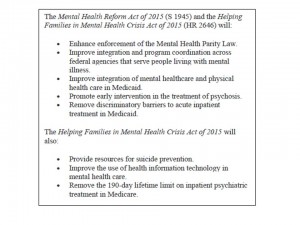Mental health problems affect about 61.5 million American adults in a given year, and about 13.6 million have a serious mental illness, according to the National Alliance on Mental Illness (NAMI, 2013). Mental Health America stated that about thirty to forty percent of U.S.-born Latinos are affected by mental health illnesses throughout their lives, while the rate for non-Latino whites is roughly fifty percent. Though U.S born Latinos have lower rates for mental illnesses in a lifetime, they are more likely to attempt suicide than non-Latino whites. Sixty percent of non-Latino whites will seek professional mental health treatment, while less than forty percent of Latinos with a mental illness will seek help from a mental health professional.
Introduction to the Problem
NAMI made the following statement towards the need for mental health reformation:
One thing that most Americans can agree on is that the mental health system is broken. In many parts of the country, mental health treatment, services and supports are not available until a crisis occurs. In some communities, jails and prisons have become the default place for mental health treatment. The facts make one thing clear: mental illness is a major public health crisis in the U.S. today.
Mental Health America also believes that one legislative priority regarding mental health should be is for there to be prevention for all, because that is a better way to treat mental disorders, then waiting until a crisis occurs.
There is a notion that Latinos don’t believe in mental disorders, and that may be true for some people that identify as Latinos. But in reality it is that Latinos don’t have as much access to mental health professionals for multiple reasons. For example, Latinos may not have insurance that will cover the costs of seeking professional mental health treatment, there are no mental health professionals in the needed areas, or there may be a language barrier. It is also important to note that from a study done by the American Psychiatric Association in 2014, Mental Health America stated that bilingual patients were evaluated differently depending on whether they were being evaluated in Spanish or English. There are very few mental health professionals that identify as Latinos, according to a fact sheet produced by NAMI, about one percent of members of the American Psychological Association self-identity as Latino. The same fact sheet also mentioned how Latino youth are misdiagnosed (if they are even diagnosed) with a conduct disorder, and Latino youth are overrepresented in the criminal system due to this misdiagnosis; which also ties with NAMI’s statement for mental health reformation.
Approaches
The Mental Health Reform Act of 2015 (S 1945) and the Helping Families in Mental Health Crisis Act of 2015 (HR 2646) are the most recent major pieces of legislation that have been introduced to Congress for the reformation on the mental health system in the United States. NAMI gave a concise summary on both of these bills, which will eventually break down barriers so that every individual and family will have access to services. Latinos will benefit from these bills because there will be improvement of integration on mental healthcare in Medicaid.
What can WE do?
- Email representatives to pass S 1945 and HR 2646
- NAMI has templates of letters you can email your representatives
- Learn more about Latino population, culture and barriers prohibiting access to mental health professionals
- Take the pledge to be stigma free on the NAMI website, “See the person, not the illness”
